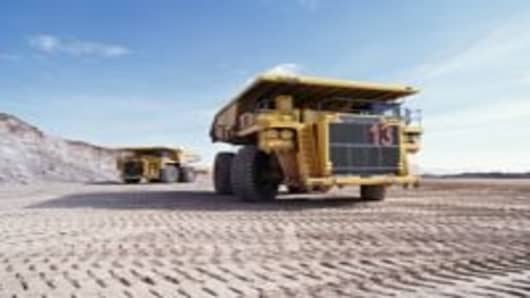Australia may be gripped by fears its mining boom is ending, but HSBC believes extraction industries will continue to power the Australian economy.
“Mining investments are in the pipeline and will continue to support growth into the second half of this year and into next year,” HSBC Chief Economist Paul Bloxhamtold CNBC.
China’s slowing economy may be dampening commodities prices worldwide, but Australian growth is likely to remain buoyant. The Aussie economy is “in good shape”, Bloxham said, highlighting the nation’s small fiscal deficit.
Australia’s government on Monday announced its federal budget ended in a slightly smaller than expected deficit in the last financial year, with the final underlying cash deficit for 2011/12 being around 45 billion Australian dollars, which compares to the 2010/11 deficit of around 49 billion Australian dollars.
Bloxham also believes the Chinese economic slowdown is “cyclical rather than structural.”
However, a research note from Barclays released earlier this week queried the notion of a soft landing for China. The current Chinese downturn is “as much structural in nature as cyclical,” with Chinese policymakers seemingly reluctant to adopt a more aggressive policy response, Barclays said.
The bank forecasts a slowdown in annual Chinese growth to six percent in the next decade. HSBC looks for Chinese expansion to accelerate into next year, providing support for commodity prices and Australian growth.
Prices ofkey commodities, including iron ore and coal, have fallen sharply in recent months. BHP Billiton, the world’s biggest mining company, earlier this month announced pay freezes for around 100 of its top managers, following an expected 10-percent fall in export revenues in the fiscal year ending in June. BHP also shelved a $20 billion copper and gold mine expansion in Australia in August.
Following weakening commodity prices, Australia’s central bank (RBA) is expected to cut its interest rates next week. The benchmark lending rate now stands at 3.5 percent and has been cut by 1.25 percentage points since November.
Australian Foreign Minister Bob Carr on Monday said Australia's economy is less reliant on its natural resources than people might think, as mining employs employs just two percent of Australians. Over the next four years, service industries such as health care, social assistance, education and training will create three times as many jobs as the commodities sector, he added.
Australia’s commodity boom shielded its $1.4 trillion economy from the worst of the global financial crisis. But, as China is Australia’s most valuable export market, a drop in Chinese demand led to a severe decline in key commodity prices.


